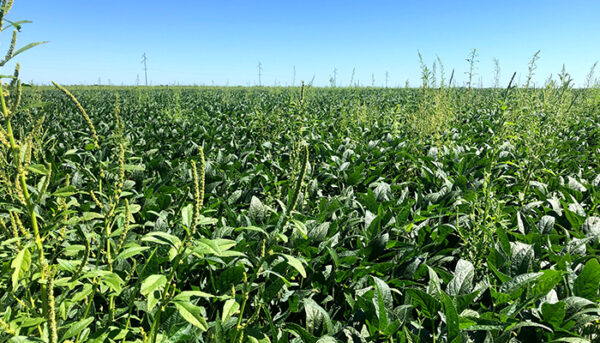Bioherbicides to Control Palmer Amaranth and Waterhemp in Soybeans
Develop and test bioherbicides that specifically target palmer amaranth (pigweed) and waterhemp without harming soybeans, while creating a commercialization roadmap to provide farmers with a cost-effective, sustainable weed control option.

Why This Research Is Important
- Palmer amaranth (pigweed) is a critical threat to U.S. soybean production, with management costs exceeding $100/acre and no guaranteed control.
- As chemical herbicide options dwindle and resistance spreads, pigweed and waterhemp are emerging as “superweeds.”
- Novel bioherbicides offer a sustainable, environmentally friendly, and potentially cost-effective alternative to traditional herbicides.
- Bioherbicides can be produced domestically in a decentralized manner, supporting:
- Local and rural economic opportunities
- Reduced dependence on volatile international chemical markets
- Greater resilience to supply chain disruptions
- This research explores the first steps toward commercializing bioherbicides for pigweed and waterhemp, which could transform weed management in soybeans.
How This Research Benefits the Farmer
- Introduces new tools for controlling pigweed and waterhemp to complement chemical herbicides.
- Supports integrated weed management, improving yields and profitability while lowering risk of herbicide resistance.
- Reduces environmental impact by limiting chemical herbicide use and runoff.
- Offers potential cost savings through effective, targeted control and domestic production that lowers input costs.
- Provides a path to practical adoption by surveying farmers, agronomists, and the chemical industry to ensure the bioherbicides fit real-world needs.
- Facilitates future-proof weed management by offering new modes of action that delay or prevent further herbicide resistance.
Research Team
- Dr. Ahmad Fakhoury, Professor, Southern Illinois University
- Dr. Burt Bluhm, Professor, University of Arkansas
- Dr. Jason Bond, Professor, Southern Illinois University
Trial Locations
- Southern Illinois University (SIU) – Greenhouse assays and bioherbicide testing on IL pigweed/waterhemp populations
- University of Arkansas (Bluhm Lab) – Bioherbicide formulation, optimization, and field trials
- Field Sampling Across Illinois – Collection of diseased pigweed and waterhemp samples from farms statewide to identify and assess local pathogen strains
About the Lead Researchers

Dr. Ahmad Fakhoury
Professor
Southern Illinois University Carbondale
618-453-1782
amfakhou@siu.edu
ARE YOU A FARMER OR ADVISOR?
If you’re a farmer or advisor, we invite you to take our Soybean Production Concerns Survey linked below to help guide future ISA research efforts. We also encourage you to contact us below with specific production challenge research ideas.
ARE YOU A RESEARCHER?
If you’re a researcher interested in working with ISA on a project, we encourage you to contact us with your ideas. The RFP will open in early March. Contact us below to be added to the mailing list for more information.


 and then
and then